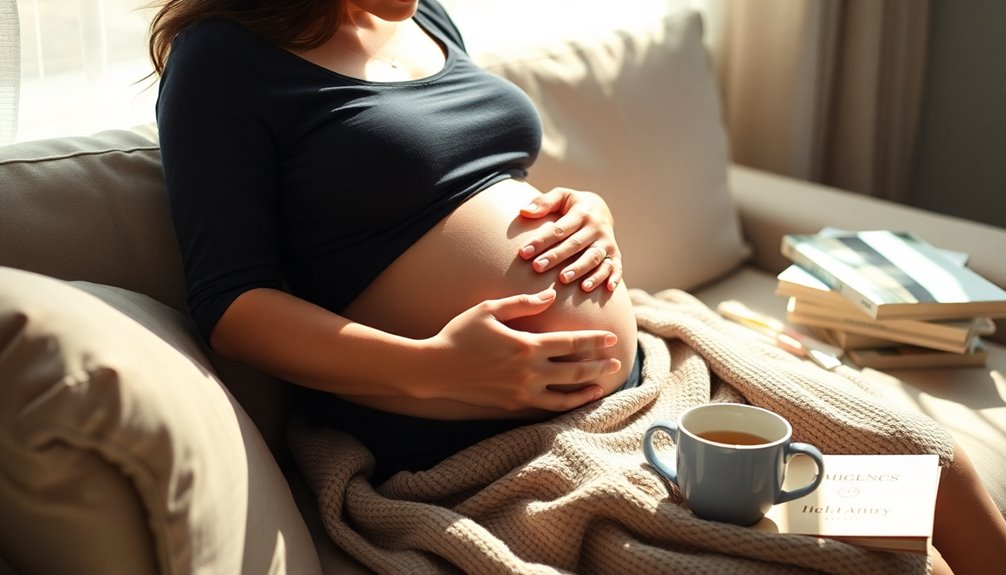Pregnancy can shock you with overwhelming weakness and fatigue, often due to hormonal shifts, low iron levels, and emotional stress. As your body adjusts, factors like dehydration and insufficient sleep can drain your energy. It's common to experience fluctuating energy levels, especially in the first and third trimesters. To manage this, focus on a balanced diet, stay hydrated, and make time for rest. The causes and solutions for your fatigue might surprise you even more.
Key Takeaways
- Hormonal changes, particularly increased progesterone, significantly contribute to fatigue during the first trimester of pregnancy.
- Low iron levels can lead to anemia, causing increased weakness and fatigue; 27 mg of daily iron is recommended.
- Dehydration is common; aim for at least 10 cups of water daily to combat fatigue.
- Emotional factors, like anxiety and stress, can drain energy levels and exacerbate feelings of fatigue.
- Regular check-ins with healthcare professionals are essential to identify and address any underlying health issues affecting energy.
Understanding Pregnancy Fatigue

Understanding pregnancy fatigue can feel overwhelming, especially when you're grappling with the physical and emotional changes that come with carrying a baby.
Pregnancy fatigue can be daunting as you navigate the emotional and physical shifts of carrying a baby.
You might often feel tired, and that's mainly due to hormonal changes, particularly the surge in progesterone during the first trimester. Your body's working hard, adjusting to increased blood volume and metabolic demands as it supports your developing baby.
You may notice shifts in your sleep patterns, needing more rest but struggling to achieve deep, restful sleep due to discomfort or frequent awakenings. It's also common to experience fatigue alongside nausea and emotional ups and downs, which can drain your energy further.
While fatigue typically improves in the second trimester, it might return in the third due to added discomfort.
Common Causes of Weakness in Pregnancy

Weakness during pregnancy can stem from several factors that affect your energy levels and overall well-being. Common causes include:
- Low iron levels, which can lead to anemia and increased fatigue.
- Dehydration, making it vital to drink at least 10 cups of water daily.
- Nutritional deficiencies, particularly regarding iron intake, as you need 27 mg daily for ideal health.
You might also experience weakness from low blood sugar due to increased metabolism and decreased appetite.
Additionally, overheating can cause feelings of sluggishness and lightheadedness. Remember to dress in lightweight clothing and stay cool to help manage these symptoms.
Finally, be sure to get plenty of rest to support your body's needs during this demanding time. Early detection of potential health issues, such as anemia, is crucial for ensuring a healthy pregnancy.
Emotional Factors Contributing to Fatigue

As you navigate the emotional landscape of pregnancy, it's common to feel overwhelmed by anxiety and stress, which can greatly drain your energy.
Emotional factors like these, along with hormonal fluctuations, can intensify mood swings and increase feelings of fatigue. You might feel tired not just physically but mentally, as thoughts about impending parenthood can lead to mental exhaustion.
Additionally, depression can creep in, manifesting as excessive sleepiness and a lack of motivation to engage in daily activities.
It's essential to acknowledge these emotional challenges and address them. Remember, taking time to rest as much as you can and prioritize your emotional health is fundamental for both your well-being and your baby's.
How Long Does Fatigue Typically Last?

Fatigue during pregnancy usually hits hardest in the first trimester, often fading as you move into the second.
You might even feel a boost in energy during this time, but don't be surprised if fatigue returns in the third trimester.
Understanding these patterns can help you manage your energy levels throughout your pregnancy.
First Trimester Fatigue Duration
During the first trimester of pregnancy, you may find yourself feeling extremely tired, with this fatigue often peaking before it starts to ease up around the beginning of the second trimester.
Hormonal changes, especially increased progesterone, play a significant role in this exhaustion. While you might experience a resurgence of energy later, fluctuations can still occur throughout your pregnancy.
Here are some tips to manage your fatigue:
- Prioritize rest and listen to your body.
- Incorporate short naps into your daily routine.
- Stay hydrated and maintain a balanced diet.
Second Trimester Energy Boost
Although many expectant parents dread the fatigue of the first trimester, you'll likely notice a significant energy boost as you enter the second trimester. Starting around the 13th week, hormonal adjustments help reduce fatigue, allowing you to feel more vibrant and active. However, sleep problems may still arise, so it's crucial to maintain a balanced diet and engage in light exercise to sustain your newfound energy levels. Additionally, proper nutrition for brain development is vital for both your health and your baby's as you progress through your pregnancy.
| Week | Energy Levels | Common Issues |
|---|---|---|
| 13 | Increased | Mild fatigue |
| 14 | High | Occasional sleep problems |
| 15 | Ideal | Slight discomfort |
| 16 | Energized | Better sleep quality |
Embrace this time; it's a wonderful opportunity to enjoy your pregnancy.
Third Trimester Reappearance of Fatigue
As you move into the third trimester, you might find that the energy boost you enjoyed earlier has faded, making way for a return of fatigue. This resurgence can be attributed to several factors, including increased weight, discomfort, and disrupted sleep patterns.
To help manage fatigue during this stage, consider:
- Adjusting your sleep habits, like side sleeping
- Using supportive pillows for comfort
- Taking short naps when possible
Hormonal fluctuations and your body's preparation for labor also play a significant role in your tiredness.
While fatigue might've lessened after the first trimester, it's common to experience varying levels of tiredness throughout the entire pregnancy, especially in these final weeks.
Prioritizing rest is essential.
Tips for Managing Tiredness During Pregnancy

Managing tiredness during pregnancy can feel challenging, but with the right strategies, you can boost your energy levels effectively.
Start by prioritizing a balanced diet rich in iron, protein, and fiber to combat fatigue. Aim for at least eight hours of sleep each night and consider taking short naps during the day to recharge.
Staying hydrated is essential, so drink at least 10 cups of water daily; dehydration can worsen tiredness. Engage in moderate-intensity exercise, like brisk walking, to elevate your mood and energy levels.
Don't hesitate to ask for help with household chores—sharing responsibilities can lighten your load and give you more time to rest.
With these tips, you'll manage tiredness better during this important time.
Recognizing When to Seek Medical Attention

When should you consider seeking medical attention for weakness during pregnancy? If you experience weakness alongside any of the following symptoms, don't hesitate to reach out to your doctor or midwife:
- Trouble breathing or shortness of breath
- Chest pains with feelings of weakness
- Sudden changes in appetite or excessive sleepiness
Frequent weakness that disrupts your daily life may indicate underlying health issues, such as iron deficiency or gestational diabetes.
Frequent weakness disrupting your daily life could signal underlying health issues like iron deficiency or gestational diabetes.
It's important to discuss any concerning symptoms with your healthcare provider to guarantee a thorough evaluation.
Lifestyle Adjustments to Combat Weakness

To combat weakness during pregnancy, you can make simple lifestyle adjustments that greatly impact your well-being.
Focus on maintaining a balanced diet, staying hydrated, and incorporating gentle exercises into your routine.
These changes can boost your energy levels and help you feel more vibrant throughout your pregnancy.
Balanced Diet Essentials
A balanced diet is essential for maintaining energy levels during pregnancy, especially as your body undergoes significant changes.
Focus on incorporating a variety of foods to support your nutritional needs and combat feelings of weakness and fatigue.
- Include iron-rich foods like lean meats, spinach, and legumes to meet your daily iron requirement.
- Opt for small, frequent meals to maintain stable blood sugar levels and provide consistent energy.
- Diversify protein sources, such as eggs, dairy, nuts, and beans, to meet increased metabolic demands.
Don't forget the importance of hydration—aim for at least 10 cups of water daily to prevent sluggishness.
Hydration Habits Matter
While you might focus on your diet during pregnancy, don't underestimate the importance of hydration. Staying well-hydrated is essential, aiming for at least 10 cups of water daily. Dehydration can leave you feeling sluggish and exacerbate weakness, so make it a habit to drink water regularly throughout the day.
To help stabilize your blood sugar levels, consider eating small, frequent meals every two hours. This approach not only supports your energy but also combats weakness. If you ever feel drained, sports drinks or carb-rich snacks can provide that quick energy boost while keeping you hydrated.
Finally, monitor your fluid intake and limit drinks before bedtime to reduce nighttime trips to the bathroom without sacrificing hydration. Additionally, proper hydration can help alleviate some of the common symptoms associated with cold medications, so staying aware of your fluid intake is crucial.
Gentle Exercise Benefits
Gentle exercise can greatly enhance your well-being during pregnancy, especially when you're feeling weak or fatigued. Engaging in activities like brisk walking or prenatal yoga boosts circulation, increases blood flow, and elevates your energy levels.
You'll find that regular movement helps you get plenty of rest by improving sleep quality and reducing hormonal fatigue. Additionally, staying hydrated by consuming foods like celery juice can further support your energy levels and overall health during this time.
Consider these gentle exercises:
- Brisk walking for improved circulation
- Prenatal yoga for flexibility and relaxation
- Light strength training for endurance
Consult your healthcare provider before starting any exercise regimen to verify it's safe for you.
Expert Insights on Pregnancy Fatigue and Weakness

Fatigue and weakness during pregnancy are common experiences that many expectant mothers face. Experts attribute these feelings primarily to hormonal changes and the body's adaptation to pregnancy, especially in the first trimester.
Kameelah Phillips, MD, stresses that extreme tiredness is typical as your body adjusts.
Patricia Evans, NP, CNM, highlights the importance of a balanced diet rich in iron and protein to combat these symptoms.
Emotional factors, like anxiety and stress, can also contribute to your fatigue and weakness.
If you notice persistent weakness or experience concerning symptoms like trouble breathing or chest pain, it's essential to consult a healthcare provider.
Regular check-ins with professionals can help monitor and address any underlying health issues affecting your energy levels.
Frequently Asked Questions
Why Does My Body Feel Weak and Tired All of a Sudden Pregnant?
If your body feels weak and tired all of a sudden during pregnancy, it could be due to hormonal changes, especially increased progesterone levels.
You might also be experiencing low blood sugar from fluctuating appetite or dehydration, as your fluid needs are higher now.
Additionally, overheating and lower blood pressure can contribute to these feelings.
Make sure you're drinking enough water, eating well, and taking breaks to rest when needed.
Is It Normal to Be in Shock When You Find Out Your Pregnant?
Finding out you're pregnant can feel like a lightning bolt striking your world, illuminating both joy and fear.
It's completely normal to be in shock. Your emotions are swirling—excitement, anxiety, disbelief—as you grapple with this major life change.
Hormonal shifts only amplify these feelings, making everything seem more intense.
What Are 5 Warning Signs of a Possible Problem During Pregnancy?
During pregnancy, it's important to recognize warning signs that could indicate a problem.
If you experience persistent weakness along with shortness of breath, it's essential to seek medical help.
Chest pains and weakness can signal heart issues.
Frequent fatigue might suggest iron deficiency or gestational diabetes.
Sudden changes in appetite or excessive sleepiness can point to prenatal depression.
Finally, any significant energy changes lasting over two weeks should prompt a discussion with your healthcare provider.
When to Go to the ER After Falling While Pregnant?
If you fall while pregnant, don't hesitate to seek medical attention if you notice any abdominal pain, vaginal bleeding, or fluid leakage.
These symptoms could indicate complications. Additionally, if you experience severe headaches, dizziness, or visual disturbances, you should head to the ER right away.
Keep an eye on fetal movements, too; a decrease warrants a consultation with your healthcare provider.
Trust your instincts and prioritize yours and your baby's safety.
Conclusion
To sum up, experiencing weakness and fatigue during pregnancy isn't uncommon—around 80% of expectant mothers report feeling more tired than usual. It's important to listen to your body and take steps to manage your energy levels. Remember, you're not alone in this journey, and seeking support when needed can make a world of difference. Prioritizing your well-being not only helps you but also benefits your growing baby. Embrace this time and take care of yourself!









